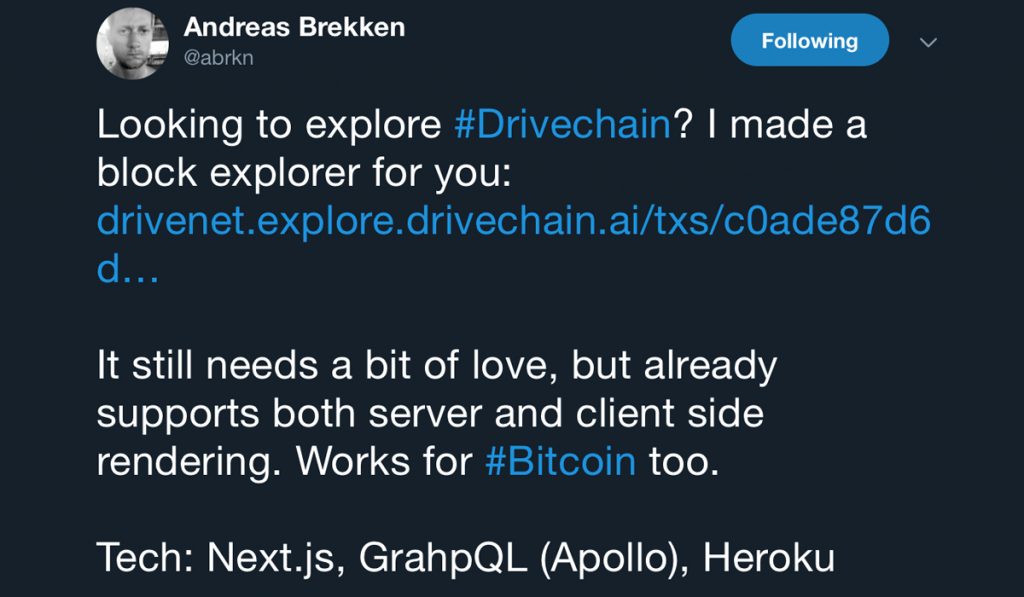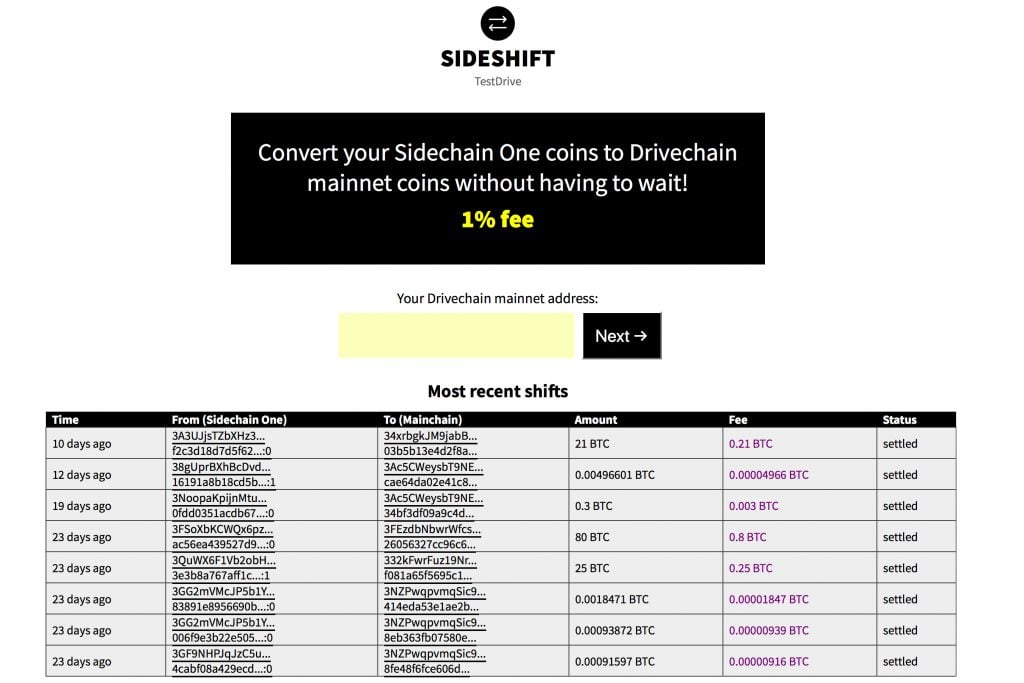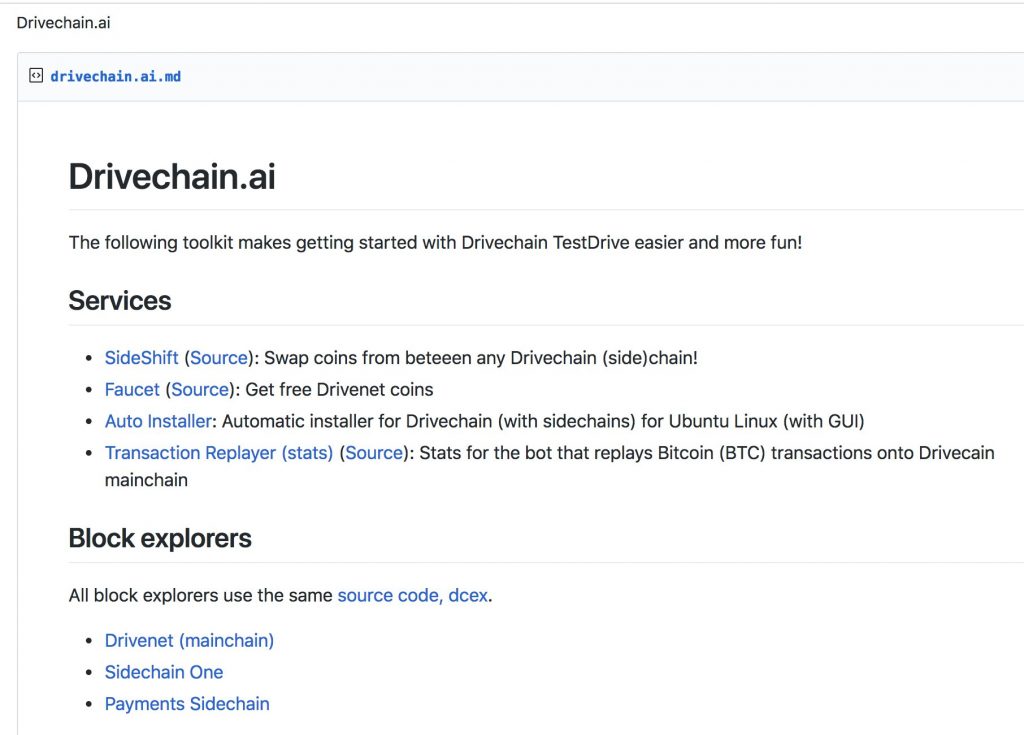Software developer Paul Sztorc revealed on Sept. 24 the launch of his first iteration of Drivechain, a sidechain concept that enables a cross-chain consensus validation system based on the proxies of miners. Since then, developers have created a faucet, block explorer, a script install, side-shift transfers, transaction replays, and another chain that resembles the Bitcoin Cash network.
Also read: BCH Devcon Streamlines Bitcoin Innovation in San Francisco
Developers Build Tools to Make Drivechain Projects Easier
Over the last few weeks, a team of programmers has been working with the Bitcoin developer Paul Sztorc since he released the first version of Drivechain. The Drivechain model is essentially a sidechain, but unlike the Liquid sidechain that uses a federation of exchange participants for consensus, the Drivechain security model uses a miner-based escrow system.

Since the Drivechain project launch, the protocol has seen a lot of development, a slew of new features, and extension applications. Developers from all types of blockchain projects have been working with Sztorc on the official Github repository and a Drivechain Telegram channel. For instance, the programmer Andreas Brekken, the infamous guy who once controlled the largest node on the Lightning Network, has developed a toolkit for people getting started with Drivechain.
“The toolkit makes getting started with Drivechain Testdrive easier and more fun,” explains Brekken’s repository.

The toolkit Brekken created has a faucet which disperses free Drivenet coins so users can test the Drivechain system. Then there’s a protocol called Sideshift.ai which allows Drivenet coins to be swapped between any chains. For a 1 percent fee, Sideshift will convert a specific sidechain coin to Drivechain mainnet coins without waiting. There’s also an auto-installer Brekken created, which automatically installs Drivechain with sidechains on Ubuntu Linux operating systems. Another useful tool is the transaction replayer called ‘Driveby,’ a protocol that replays BTC transactions on to the main chain. Then there’s a set of block explorers for the Drivenet (mainchain), sidechain one, and the payments sidechain. In addition to Brekken’s help, many developers have been contributing and discussing the Drivechain project via the group’s Telegram channel.

The ‘Boring’ Chain and the Competitive Chain
Speaking with news.Bitcoin.com, Brekken says that at the moment, the Drivechain project is in earliest testing phase and there are a lot of kinks to iron out before mainnet work can begin. Following the toolkit launch on Oct. 22, Sztorc revealed to his Twitter followers that Drivenet now has two sidechains. “Sidechain One, a boring copy of Bitcoin Core, for testing purposes only, and Paychain, a Bitcoin ABC-like chain, to compete with BCH,” Sztorc details.
“ABC describes where the BCH are — This sidechain software, ‘Paynet’, describes where its paynet-Bitcoin are — And it does so following [mostly] the same consensus rules as ABC,” Sztorc explains. “Basically, it has some edits to support larger blocks.”

Sztorc also spoke with news.Bitcoin.com regarding the recent development and enthusiasm toward Drivechain. The developer explains he’s been pleased with everyone contributing and offering ideas.
“It has been really great,” Sztorc details. “I never thought we would have all of this stuff — faucet, block explorer, and the ‘Sideshift’ service — so quickly. This software was produced by basically one guy, working from mid-2016 to mid-2018. In that time we’ve managed to solve the industry’s key problem: consensus disputes. These disputes led to consensus-disabling phenomena such as Altcoins or hard forks. And these disputes are the key driver of the blocksize debate, the extreme polarization and nasty debate, the rise of misguided projects (such as Ethereum and private blockchains).
Sztorc further explains that the software allows for an unlimited number of safe, optional, and ignorable blocksize increases. “It also makes substantial progress on the ‘Bitcoin’s long run hashrate security without inflation’ problem, and it even makes it easier to run a competitive pool,” the Bitcoin developer adds.
Sztorc concludes by stating:
The only new security assumption is that: what is true of the one popular chain will also be true of a few smaller chains — That’s almost as good as it gets.
The influx of Drivechain development also follows the recent launch of Blockstream’s sidechain product, Liquid. However, the sidechain has come under scrutiny for being centralized by quite a few members of the cryptocurrency community. This has sparked a debate over whether or not federated sidechains are better than drivechains that utilize miners for consensus.

In addition to the group of programmers from both BTC and BCH development camps helping Sztorc with the Drivechain protocol and extensions, there’s also a Drivechain ‘propaganda’ merchandise shop called the Drivechain store. The store is similar to the e-commerce site that sells UASF hats and bottles of water that wield the Liquid logo. The Drivechain store also sells apparel, jewelry, home decor, and accessories for enthusiasts who just might be obsessed with the sidechain protocol.
What do you think about all the development surrounding the Drivechain project? Let us know what you think about this protocol in the comments section below.
Images via Shutterstock, Twitter, the Drivechain store, and Github.
At news.Bitcoin.com all comments containing links are automatically held up for moderation in the Disqus system. That means an editor has to take a look at the comment to approve it. This is due to the many, repetitive, spam and scam links people post under our articles. We do not censor any comment content based on politics or personal opinions. So, please be patient. Your comment will be published.
The post Drivechain Project Sees an Influx of Development Since Launch appeared first on Bitcoin News.














